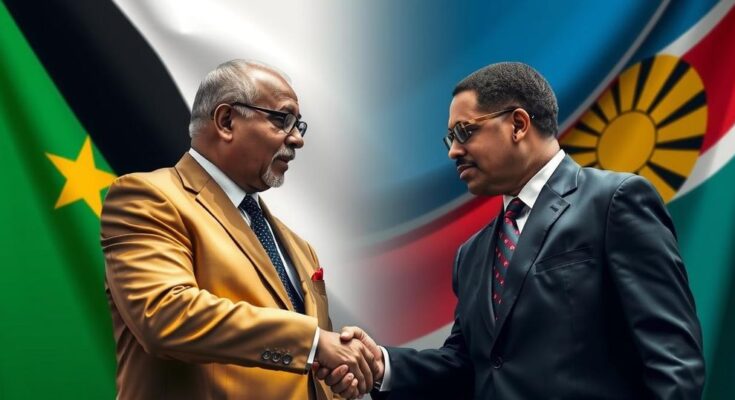Zimbabwean President Mnangagwa engages with Botswana’s new leader Duma Boko during World Children’s Day to strengthen bilateral relations after a significant electoral shift in Botswana. This meeting emphasizes cooperation in trade, security, and economic partnerships while addressing the challenges facing traditional liberation movements in the region.
On World Children’s Day, Zimbabwean President Emmerson Mnangagwa seized an opportunity to engage with Botswana’s newly elected leader Duma Boko in Victoria Falls. This engagement aims to mend relations following the upsetting electoral loss of Botswana’s former President Mokgweetsi Masisi, a close ally of Mnangagwa. With Boko’s Umbrella for Democratic Change (UDC) unseating the long-standing Botswana Democratic Party (BDP), the diplomatic relations between Zimbabwe and Botswana have come under strain. An insider mentioned, “President Mnangagwa recognised the need to engage President Boko early to ensure strong cooperation between the two nations.” The discourse focused on enhancing bilateral cooperation, avoiding the diplomatic pitfalls seen in Mnangagwa’s prior dealings with Zambian President Hakainde Hichilema. Key discussion points included trade, border management, and security collaboration to foster economic partnerships. Boko’s election signifies a notable shift in Southern Africa’s political climate, challenging the enduring dominance of liberation movements like Zimbabwe’s ZANU-PF and South Africa’s ANC. At Boko’s inauguration, Mnangagwa and Masisi experienced harsh reception compared to the warm acknowledgment of opposition figures, which underscores the changing political allegiance within the region. Reflecting on past diplomatic errors, Mnangagwa chose a proactive approach in engaging with Boko to prevent repeating mistakes that have tarnished relations elsewhere. The meeting highlights a strategic imperative to align on mutual national interests despite contrasting political ideologies. This engagement signifies a crucial juncture in regional politics, indicating a transition toward opposition-led governance amidst the traditional liberation-party hegemony. Ultimately, as both countries navigate complex bilateral relations, the outcome will test Mnangagwa’s ability to strike a balance between maintaining his ideological roots while embracing necessary pragmatic collaborations.
The political landscape of Southern Africa is undergoing significant transformation, particularly following electoral victories by opposition parties like the Umbrella for Democratic Change (UDC) in Botswana. This shift threatens the historical dominance of liberation movements led by parties such as ZANU-PF in Zimbabwe and the ANC in South Africa. President Emmerson Mnangagwa’s interactions with newly elected leaders like Duma Boko reflect an effort to adapt to these changes and reassess diplomatic ties after previous challenges with leaders like Zambian President Hichilema.
In conclusion, President Mnangagwa’s timely engagement with Botswana’s new leader Duma Boko illustrates a strategic maneuver to rebuild and enhance bilateral relations amid shifting political dynamics in Southern Africa. The willingness to prioritize collaboration over political differences may prove significant as both Zimbabwe and Botswana navigate contemporary challenges while seeking regional stability and growth.
Original Source: www.thezimbabwemail.com




